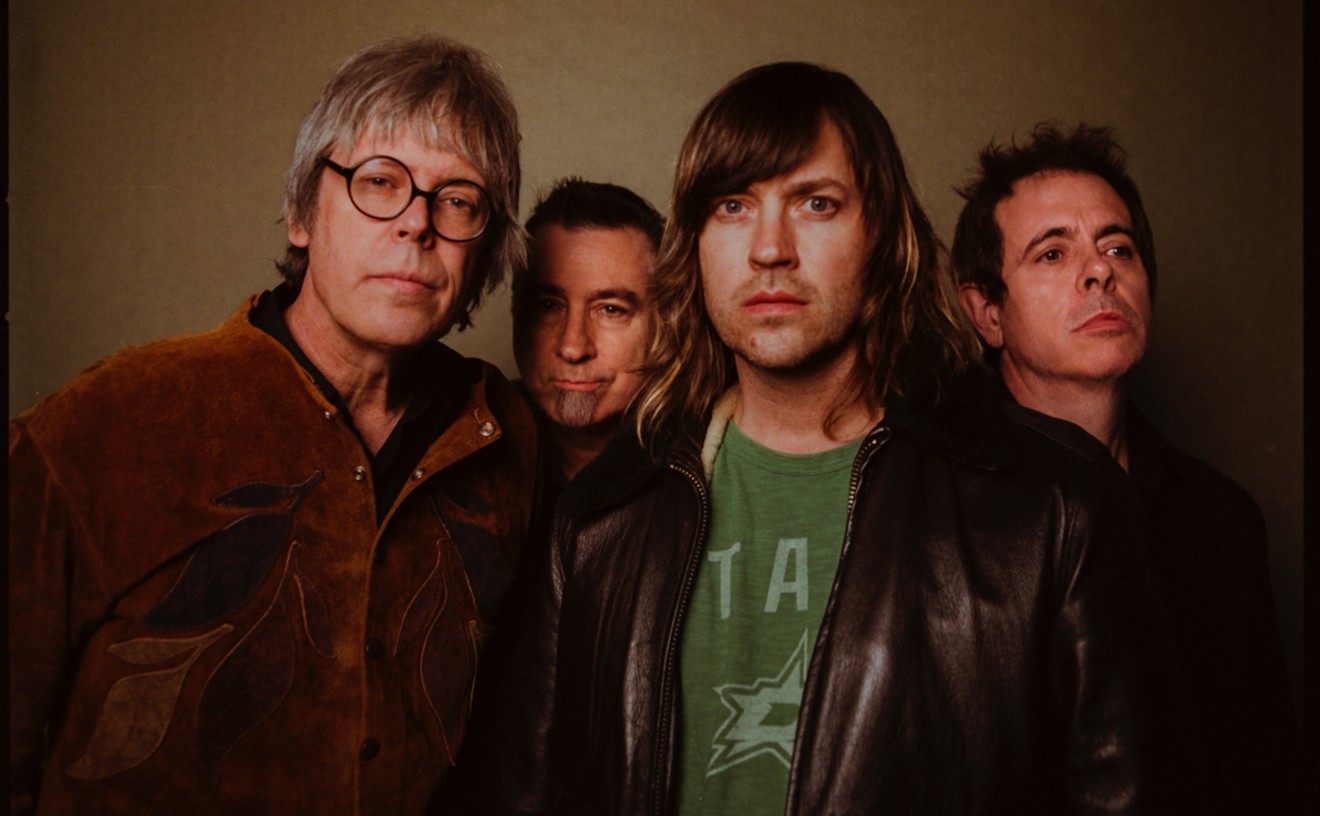Travis bassist Dougie Payne is in Detroit. Or rather, the tour bus he's on with his bandmates--singer-guitarist Fran Healy, guitarist Andy Dunlop and drummer Neil Primrose--is in Detroit. Payne only knows he's in Detroit ("Motown," he says, savoring both syllables) because the bus driver just announced it over the loudspeaker. Such is life when you're in one of the most beloved British bands--both at home and in America--living life in a cocoon, giving dear-diary entries to reporters. Sure, Travis' status in the States is nowhere near the position they've held in the U.K. in the wake of the release of 1999's The Man Who (which was released in the U.S. last year), but the band is not exactly struggling either. The Man Who spawned several hit singles overseas (including the song that serves as something of a mission statement for the band, "Why Does It Always Rain on Me?") and has sold almost 3 million copies in England since its release. American fans paid attention as well, flocking to the group's sincere, wide-screen approach to guitar-pop.
Not surprisingly, this year's follow-up, the top-of-their-game The Invisible Band, entered the U.K. charts at No. 1 and has opened the door into America even wider for the Scottish quartet. The band may never be household names, but their songs do have a good chance of being on the tip of more than a few tongues. According to Payne, that's Travis' job. They don't want people to stop them in the street. No, they just want you to sing.
Dallas Observer: How much smaller are the venues you're playing at here than the ones you've been playing overseas, if any?
DP: Strangely enough, in Britain, we haven't done the massive shows, you know, the big arena shows. We've kept it to theater shows. The biggest place that we've played in Britain, inside, on our own, apart from, like, the festivals, was a place called the Brixton Academy. Which is about 5,000 people. And the biggest place we've played in America is Radio City [Music Hall] in New York, and that's 6,000 people. So it's kind of the same, you know?
DO: Would you prefer to keep it at that size?
DP: We would, but it's not possible now to keep it like that in Britain. We've already booked our tour in February, which is, like, the big arena tour, which is about 10,000 people a night, 10-12,000 a night. That's our first big tour like that, big shows.
DO: Do you feel like you have to change your show at all to play the big arenas?
DP: Certainly we have to make the production more theatrical. The production values have to be increased, the show itself, the light thing, the backdrops. A bit more imagination has to go into how it's presented. But as far as playing goes, you know, we play the same whatever the size of the stage, whether it be in a pub or on a massive stage at Glastonbury. We play the same. We can't play any other way.
DO: How does selling this many records change your day-to-day life?
DP: Oh, not at all. Your day-to-day doesn't change. I mean, the only thing that changes is that you're busier. You know, you've got a lot more work to do, and a lot more places to go. But generally, when we're at home--which is rare, I admit--but when we are there, it doesn't change. I think it tends to be a bit about the way that you carry yourself. You know, if you carry yourself like the rock star, then people are going to go, "Oh, who's that?" "Oh, right, it's that guy." But if you go about your business like you would do normally, then nobody really notices, nobody gives you any hassle.
DO: You started recording the new album fairly quickly after you finished touring behind The Man Who. Why was that?
DP: We had these stories about Bob Dylan going straight in after doing two years of touring, and recording Blood on the Tracks and these great records, made by bands that were kind of, you know, on form at that point. Bands that were playing well, and had been playing together every night for a long time. And we thought that might be a valuable way to go into the studio. And it was, but in a different way than we expected.
DO: How was it different?
DP: It brought home to us the difference between playing live and playing in a studio, and there's a massive difference there. We had to go through a fairly painful process of getting rid of our egos and our self-confidence in the studio to get down to making a record again, rather than just showing off.
DO: Did that change the sound of the record?
DP: I'm sure it did, but I wouldn't presume to say how it changed it. It was just us kind of growing up a bit, and maybe just getting a bit wiser about the studio. Although we're still idiots. [Laughs.] So, yeah, it was definitely a good thing to do, but I would doubt that we'll do it again. Because once we've finished this tour, which will take us up to next summer, probably, that will be a good four years solidly without a break that we've been touring-writing-recording, touring-writing-recording. So, I think it's time for a small break after this one. But you never know. Knowing us, we'll probably go back into the studio and make another album in a month, for fuck's sake. [Laughs.]
DO: Why did you decide to record in Los Angeles?
DP: That was [producer] Nigel's [Godrich] choice. Nigel chose to go to a studio called Ocean Way, because he'd recorded there with Beck, and said it was a fantastic studio. It was his favorite studio that he'd ever worked in, and he's worked everywhere. We kind of took him at his word and went over there. And it was good, you know? It was a good place to work. It was hard being away from home for extra time after all that time away. We were there for five weeks, and then we went home for a bit, and then we were there for another five weeks after Christmas. So it was definitely hard, but I think it was worthwhile, because it meant we had nothing else except making the record. Because we don't know that many people in L.A., and we don't have a big social network there, and we don't have homes there or anything. So, it was like we had nothing except for the studio and a hotel room. It made us concentrate harder on the record, I think, as opposed to having any distractions there.
DO: How do you find a way to be normal when you're out on the road and in the studio that much?
DP: There's no way to be normal. [Laughs.]
DO: So you just find what's normal for that situation?
DP: Yeah, it's kind of like being a chameleon or something. You try to adapt to your circumstances and just get through it. You phone your fiancée every day, kind of touch base, just try to keep your head. We're kind of lucky, in that we've got a fantastic lot of people around us. Tour manager, the crew, the band itself, and everybody is just fantastic. So everybody looks after each other. And I think that's an important thing. It's not like a wild, debauched, Mötley Crüe kind of thing, where everyone's just going mad. It's quite familial.
DO: Now that you're going back to Europe to play the bigger venues, do you think it will be hard to keep the band from getting bigger than the songs?
DP: Nah, it's amazing, actually. We played Glastonbury, which is the biggest show we've ever done, which is in front of 140,000 people or something, and it was amazingly intimate. And I think it's because the songs have a very personal nature to them, which seem to be directed at one person. And I think that works on whatever scale you put them in. The songs stand above everything. The thing that we've taken away from the shows, more than anything, is not people screaming our names or shouting for us as people. Standing up, doing the Beatlemania thing. The thing we've taken away, more than anything, is people singing. Which means that we're doing our job, getting the songs through to the people. And I think you can do that on any scale.










